
The embattled Belarusian president has hinted at a new wave of repression, in another sign he is seeking to outlast a protest movement that has brought him face-to-face with former supporters calling on him to resign.
Alexander Lukashenko described an opposition plan to form a “coordination council” that would oversee a political transition in the country as “an attempt to seize power”.
Aides to the exiled opposition leader, Svetlana Tikhanovskaya, announced the plans on Tuesday, saying they would form a 70-person council that would include representatives of political parties and prominent cultural figures, including the Nobel prize-winning author Svetlana Alexievich. Tikhanovskaya has said she is ready to serve as a “national leader” until new elections can be arranged.
“I want to warn those who have joined this council that we will take adequate measures in response,” Lukashenko told a meeting of his security council. “Fully within the constitution and the law, but we have enough of such measures to cool down a few hot heads.” He also said he had put the Belarusian army on full combat alert on the country’s western border.
Lukashenko’s grip on power has looked increasingly shaky in recent days, as the protest mood culminated in the largest rally in recent Belarusian history against his rule on Sunday. Widespread strikes in factories across the country have added to his problems as he faces the gravest crisis of his 26 years in power.
However, on Tuesday there were signs that the resolve of striking workers may be weakening in the face of threats from management, and the fighting talk to his security council suggested Lukashenko is seeking to shore up support among the security services and army.
The president also announced awards to 300 members of his riot police force and KGB for “impeccable service” on Tuesday. The awards, dated 13 August, recognise senior officials and lower-ranking officers believed to have taken part in last week’s bloody crackdown against protesters, during which more than 7,000 people were detained.
The violence following this month’s rigged elections has also brought threats of sanctions and pressure from Europe on Lukashenko to begin negotiations with the opposition, while the embattled leader has called on the Russian president, Vladimir Putin, to intervene in his support.
Putin spoke with the German chancellor, Angela Merkel, and the French president, Emmanuel Macron, on Tuesday. A spokesman for Merkel said she had told Putin that Belarus should release political prisoners and hold a “national dialogue with the opposition and society”.
The Kremlin has been hesitant to provide a public endorsement of Lukashenko in his standoff with his own people, but has appeared to have drawn a line at further EU pressure on him. The Kremlin said Putin had warned Merkel about “outside interference” in Belarus.
Members of the European council will hold an emergency summit on Wednesday, during which they may call on Lukashenko to step down or consider other efforts to punish him for the recent crackdown.
There are also signs of growing support among EU leaders for Tikhanovskaya, who is currently in Lithuania. The Polish prime minister, Mateusz Morawiecki, said on Monday evening he had spoken by phone with Tikhanovskaya and “assured her that Belarusians had Poland’s full support”. The Lithuanian foreign minister, who has also spoken with Tikhanovskaya, has called Lukashenko the “former head of state”.
Maria Kolesnikova, the only one of the all-female trio behind Tikhanovskaya’s campaign still remaining in Belarus, said her team was in touch with ambassadors from Russia and EU countries in Minsk.
“With the president threatening some kind of Russian intervention, it was important to let them know our position. We sent documents to the Russian ambassador and we are talking to Russian media to make sure our view gets across,” Kolesnikova told the Guardian outside a theatre in Minsk, where she had come to show support to striking actors.
Since last Wednesday, riot police have retreated from confrontations with protesters, and for the past few days Minsk has resembled a carnival, with columns of flag-waving and cheering protesters marching through the city.
Although he appears to have lost legitimacy among huge swathes of the population, Lukashenko has remained defiant, even while being confronted by striking workers at a state-run factory in Minsk on Monday. “We held the elections and until you kill me, there won’t be any new elections,” he said amid a chorus of boos and calls for him to resign.
On Tuesday, strike organisers at the Minsk Tractor Works on the outskirts of the city said they had been called in by management and threatened with sanctions or dismissal if they continued their action. Several hundred protesters gathered outside the factory chanting in support of the workers, but the strike leader, Sergei Dylevsky, said only about 3,000 of the plant’s 15,000 workers had signed a protest statement, and only about 250 were ready “to go all the way” even if it meant being fired.
“I have come to the point where hatred has overcome fear, but most people are still scared of losing their job,” he said. “I am a bit disappointed, I had hoped more people would join us.”
Kolesnikova said it was becoming apparent that Lukashenko was planning to cling on to power but she was adamant the protest movement would win in the end. “I am certain that Belarusians won’t stop until these authorities are changed. But it might be a long process,” she said.











